Exploring Self-Efficacy, Motivation and Engagement in Education
VerifiedAdded on 2021/06/18
|14
|3149
|30
Essay
AI Summary
This essay delves into the critical influence of self-efficacy, motivation, and engagement on student academic success. It begins by establishing the significance of these factors in shaping an individual's overall attitude and performance, highlighting their impact on both academic and professional achievements. The literature review explores the nuances of motivation, distinguishing between intrinsic and extrinsic drivers and their effects on learning commitment. It then examines student engagement, differentiating between behavioral and cognitive aspects and their respective contributions to academic outcomes. The concept of self-efficacy is then introduced, detailing its sources, including mastery and vicarious experiences, and its role in predicting success. The essay synthesizes these elements to demonstrate the interconnectedness of engagement, motivation, and self-efficacy in influencing the learning process and future academic growth. The essay concludes by emphasizing the importance of understanding these factors to enhance student performance.
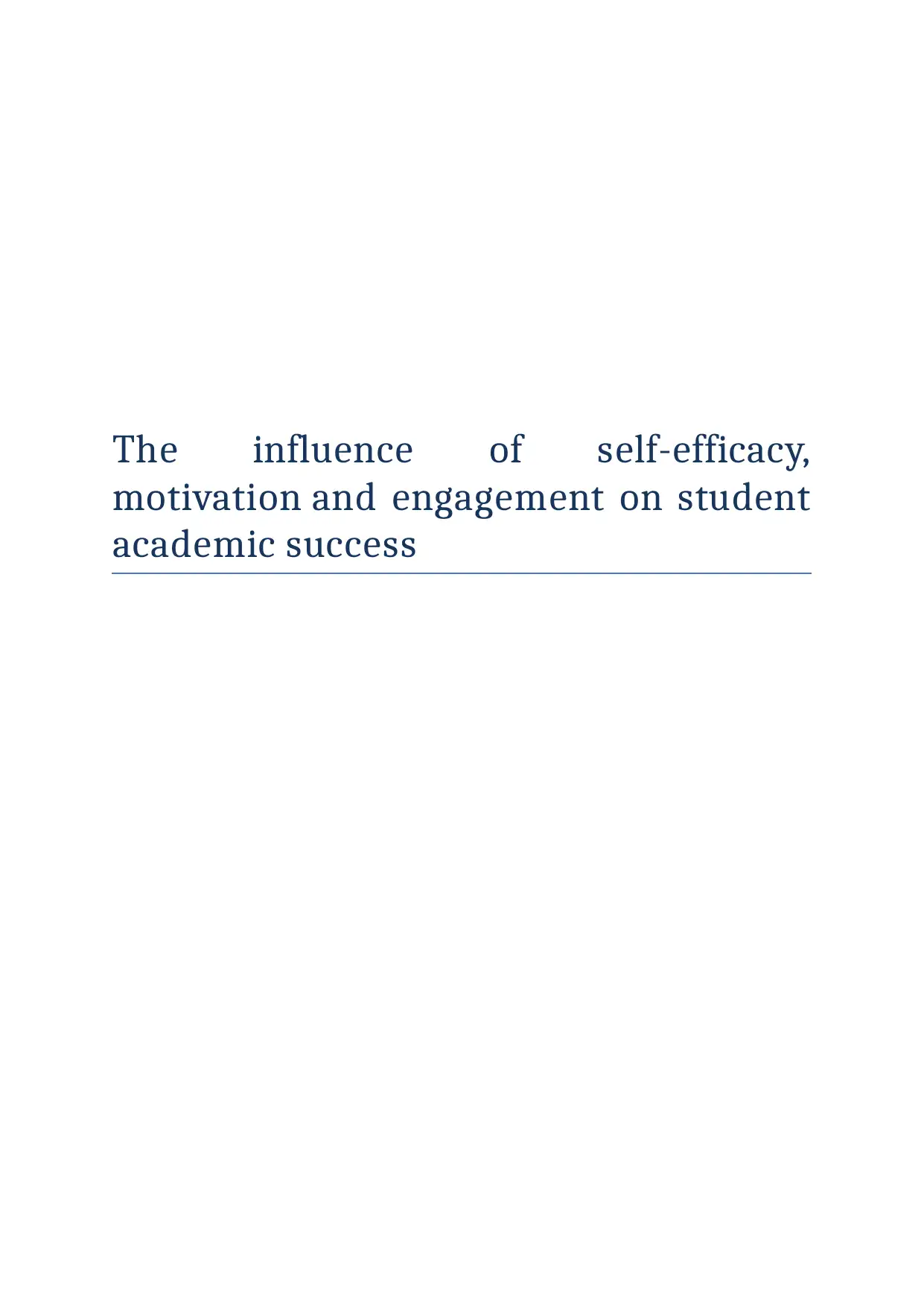
The influence of self-efficacy,
motivation and engagement on student
academic success
motivation and engagement on student
academic success
Paraphrase This Document
Need a fresh take? Get an instant paraphrase of this document with our AI Paraphraser
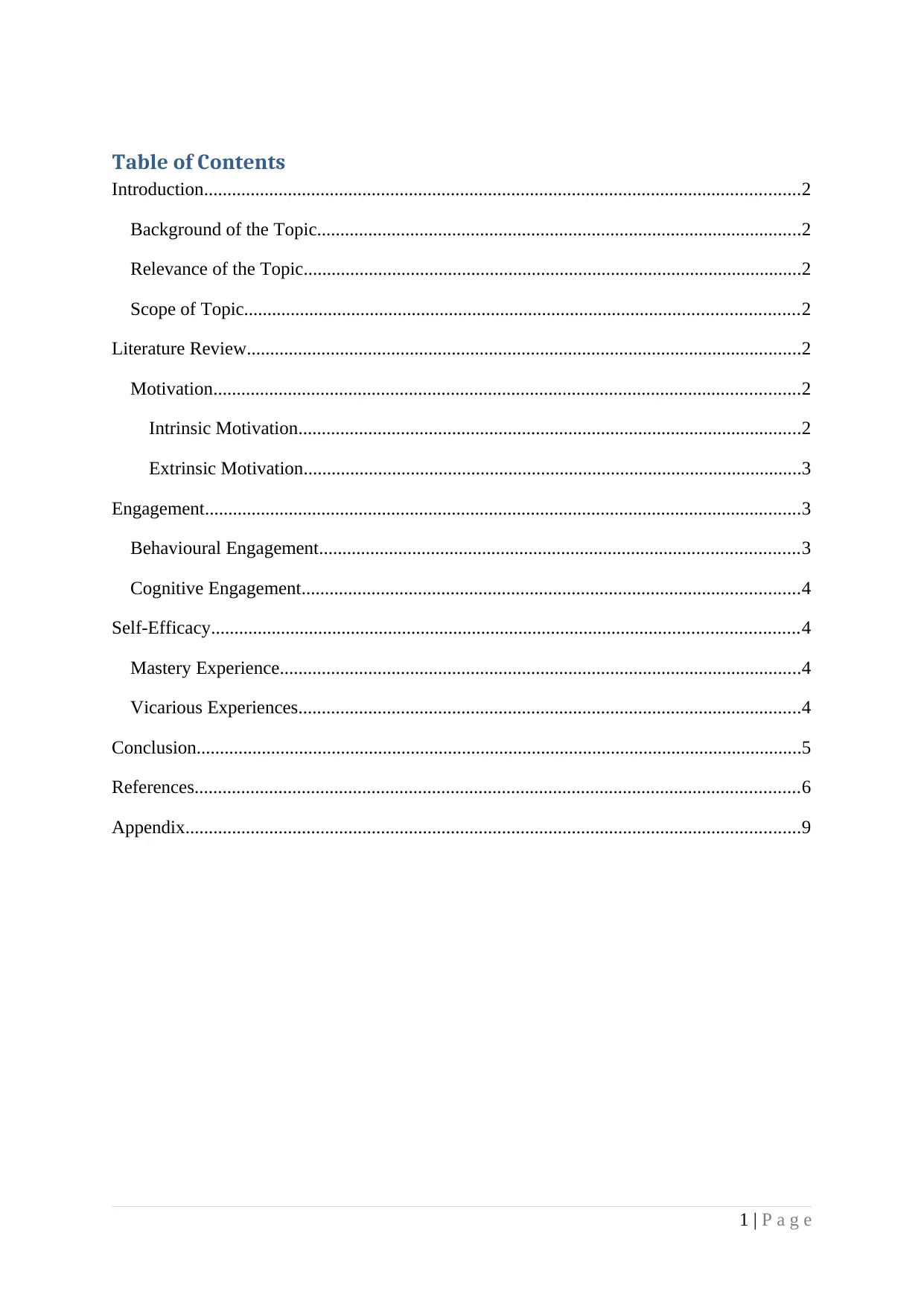
Table of Contents
Introduction................................................................................................................................2
Background of the Topic........................................................................................................2
Relevance of the Topic...........................................................................................................2
Scope of Topic.......................................................................................................................2
Literature Review.......................................................................................................................2
Motivation..............................................................................................................................2
Intrinsic Motivation............................................................................................................2
Extrinsic Motivation...........................................................................................................3
Engagement................................................................................................................................3
Behavioural Engagement.......................................................................................................3
Cognitive Engagement...........................................................................................................4
Self-Efficacy..............................................................................................................................4
Mastery Experience................................................................................................................4
Vicarious Experiences............................................................................................................4
Conclusion..................................................................................................................................5
References..................................................................................................................................6
Appendix....................................................................................................................................9
1 | P a g e
Introduction................................................................................................................................2
Background of the Topic........................................................................................................2
Relevance of the Topic...........................................................................................................2
Scope of Topic.......................................................................................................................2
Literature Review.......................................................................................................................2
Motivation..............................................................................................................................2
Intrinsic Motivation............................................................................................................2
Extrinsic Motivation...........................................................................................................3
Engagement................................................................................................................................3
Behavioural Engagement.......................................................................................................3
Cognitive Engagement...........................................................................................................4
Self-Efficacy..............................................................................................................................4
Mastery Experience................................................................................................................4
Vicarious Experiences............................................................................................................4
Conclusion..................................................................................................................................5
References..................................................................................................................................6
Appendix....................................................................................................................................9
1 | P a g e
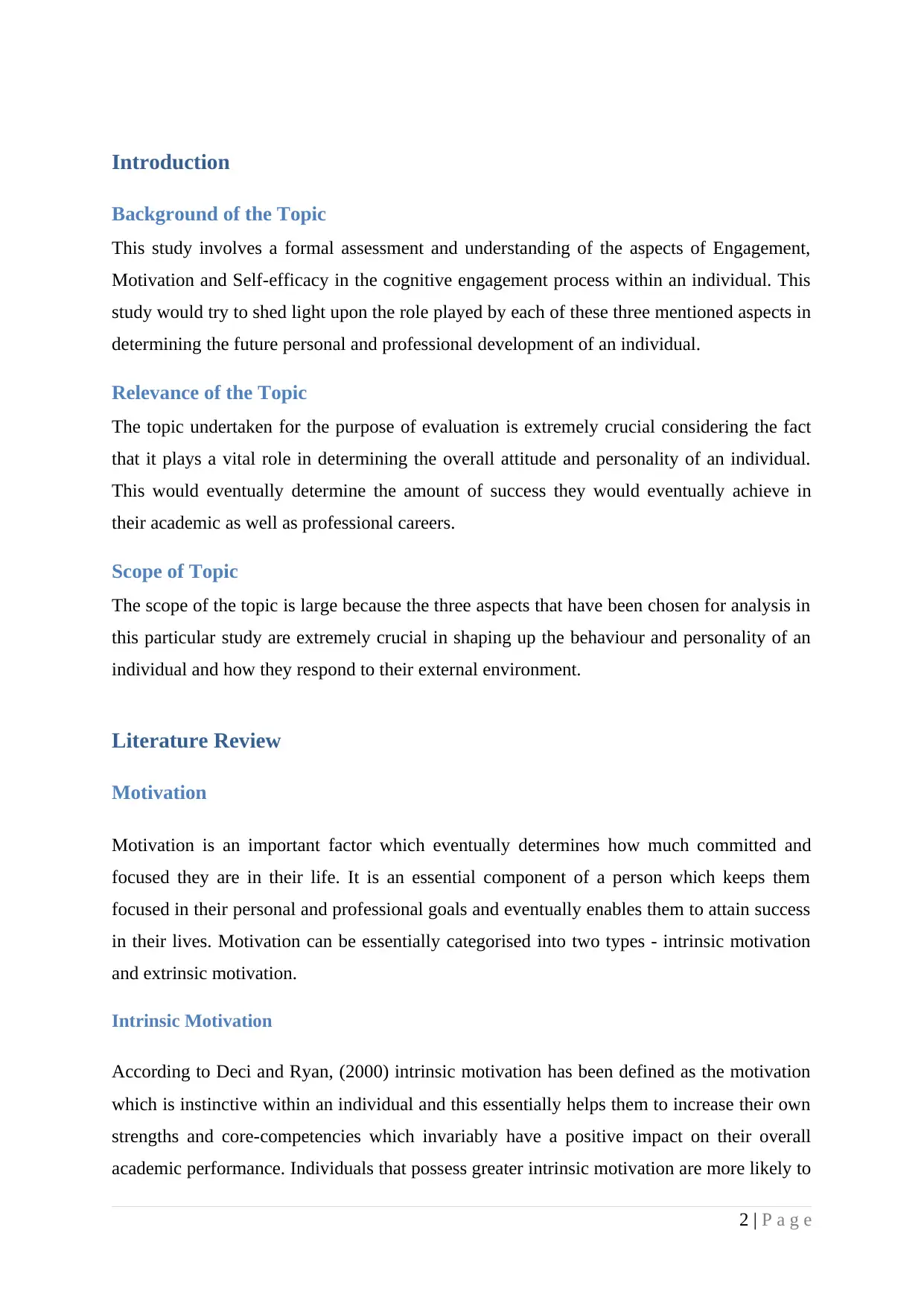
Introduction
Background of the Topic
This study involves a formal assessment and understanding of the aspects of Engagement,
Motivation and Self-efficacy in the cognitive engagement process within an individual. This
study would try to shed light upon the role played by each of these three mentioned aspects in
determining the future personal and professional development of an individual.
Relevance of the Topic
The topic undertaken for the purpose of evaluation is extremely crucial considering the fact
that it plays a vital role in determining the overall attitude and personality of an individual.
This would eventually determine the amount of success they would eventually achieve in
their academic as well as professional careers.
Scope of Topic
The scope of the topic is large because the three aspects that have been chosen for analysis in
this particular study are extremely crucial in shaping up the behaviour and personality of an
individual and how they respond to their external environment.
Literature Review
Motivation
Motivation is an important factor which eventually determines how much committed and
focused they are in their life. It is an essential component of a person which keeps them
focused in their personal and professional goals and eventually enables them to attain success
in their lives. Motivation can be essentially categorised into two types - intrinsic motivation
and extrinsic motivation.
Intrinsic Motivation
According to Deci and Ryan, (2000) intrinsic motivation has been defined as the motivation
which is instinctive within an individual and this essentially helps them to increase their own
strengths and core-competencies which invariably have a positive impact on their overall
academic performance. Individuals that possess greater intrinsic motivation are more likely to
2 | P a g e
Background of the Topic
This study involves a formal assessment and understanding of the aspects of Engagement,
Motivation and Self-efficacy in the cognitive engagement process within an individual. This
study would try to shed light upon the role played by each of these three mentioned aspects in
determining the future personal and professional development of an individual.
Relevance of the Topic
The topic undertaken for the purpose of evaluation is extremely crucial considering the fact
that it plays a vital role in determining the overall attitude and personality of an individual.
This would eventually determine the amount of success they would eventually achieve in
their academic as well as professional careers.
Scope of Topic
The scope of the topic is large because the three aspects that have been chosen for analysis in
this particular study are extremely crucial in shaping up the behaviour and personality of an
individual and how they respond to their external environment.
Literature Review
Motivation
Motivation is an important factor which eventually determines how much committed and
focused they are in their life. It is an essential component of a person which keeps them
focused in their personal and professional goals and eventually enables them to attain success
in their lives. Motivation can be essentially categorised into two types - intrinsic motivation
and extrinsic motivation.
Intrinsic Motivation
According to Deci and Ryan, (2000) intrinsic motivation has been defined as the motivation
which is instinctive within an individual and this essentially helps them to increase their own
strengths and core-competencies which invariably have a positive impact on their overall
academic performance. Individuals that possess greater intrinsic motivation are more likely to
2 | P a g e
⊘ This is a preview!⊘
Do you want full access?
Subscribe today to unlock all pages.

Trusted by 1+ million students worldwide
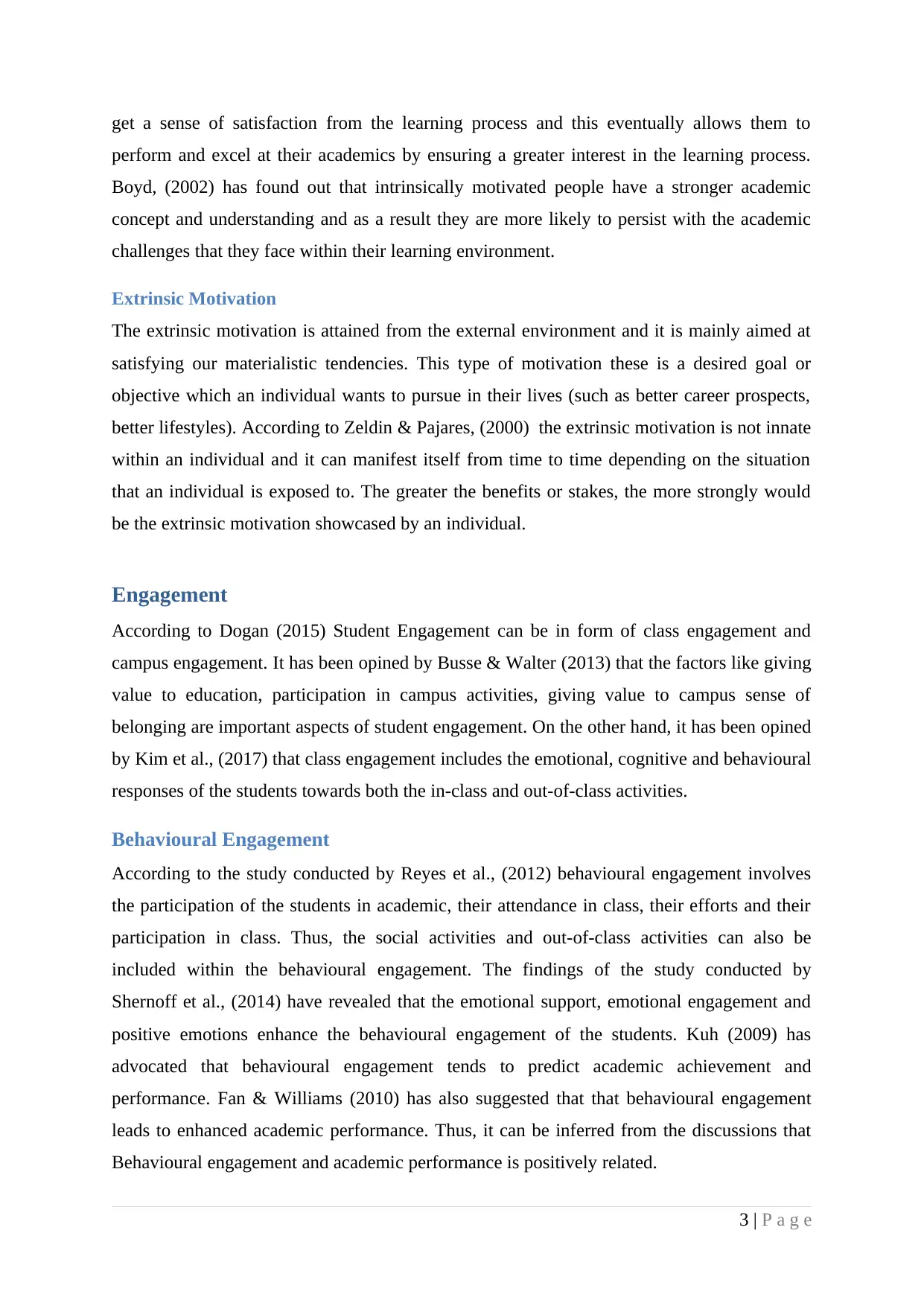
get a sense of satisfaction from the learning process and this eventually allows them to
perform and excel at their academics by ensuring a greater interest in the learning process.
Boyd, (2002) has found out that intrinsically motivated people have a stronger academic
concept and understanding and as a result they are more likely to persist with the academic
challenges that they face within their learning environment.
Extrinsic Motivation
The extrinsic motivation is attained from the external environment and it is mainly aimed at
satisfying our materialistic tendencies. This type of motivation these is a desired goal or
objective which an individual wants to pursue in their lives (such as better career prospects,
better lifestyles). According to Zeldin & Pajares, (2000) the extrinsic motivation is not innate
within an individual and it can manifest itself from time to time depending on the situation
that an individual is exposed to. The greater the benefits or stakes, the more strongly would
be the extrinsic motivation showcased by an individual.
Engagement
According to Dogan (2015) Student Engagement can be in form of class engagement and
campus engagement. It has been opined by Busse & Walter (2013) that the factors like giving
value to education, participation in campus activities, giving value to campus sense of
belonging are important aspects of student engagement. On the other hand, it has been opined
by Kim et al., (2017) that class engagement includes the emotional, cognitive and behavioural
responses of the students towards both the in-class and out-of-class activities.
Behavioural Engagement
According to the study conducted by Reyes et al., (2012) behavioural engagement involves
the participation of the students in academic, their attendance in class, their efforts and their
participation in class. Thus, the social activities and out-of-class activities can also be
included within the behavioural engagement. The findings of the study conducted by
Shernoff et al., (2014) have revealed that the emotional support, emotional engagement and
positive emotions enhance the behavioural engagement of the students. Kuh (2009) has
advocated that behavioural engagement tends to predict academic achievement and
performance. Fan & Williams (2010) has also suggested that that behavioural engagement
leads to enhanced academic performance. Thus, it can be inferred from the discussions that
Behavioural engagement and academic performance is positively related.
3 | P a g e
perform and excel at their academics by ensuring a greater interest in the learning process.
Boyd, (2002) has found out that intrinsically motivated people have a stronger academic
concept and understanding and as a result they are more likely to persist with the academic
challenges that they face within their learning environment.
Extrinsic Motivation
The extrinsic motivation is attained from the external environment and it is mainly aimed at
satisfying our materialistic tendencies. This type of motivation these is a desired goal or
objective which an individual wants to pursue in their lives (such as better career prospects,
better lifestyles). According to Zeldin & Pajares, (2000) the extrinsic motivation is not innate
within an individual and it can manifest itself from time to time depending on the situation
that an individual is exposed to. The greater the benefits or stakes, the more strongly would
be the extrinsic motivation showcased by an individual.
Engagement
According to Dogan (2015) Student Engagement can be in form of class engagement and
campus engagement. It has been opined by Busse & Walter (2013) that the factors like giving
value to education, participation in campus activities, giving value to campus sense of
belonging are important aspects of student engagement. On the other hand, it has been opined
by Kim et al., (2017) that class engagement includes the emotional, cognitive and behavioural
responses of the students towards both the in-class and out-of-class activities.
Behavioural Engagement
According to the study conducted by Reyes et al., (2012) behavioural engagement involves
the participation of the students in academic, their attendance in class, their efforts and their
participation in class. Thus, the social activities and out-of-class activities can also be
included within the behavioural engagement. The findings of the study conducted by
Shernoff et al., (2014) have revealed that the emotional support, emotional engagement and
positive emotions enhance the behavioural engagement of the students. Kuh (2009) has
advocated that behavioural engagement tends to predict academic achievement and
performance. Fan & Williams (2010) has also suggested that that behavioural engagement
leads to enhanced academic performance. Thus, it can be inferred from the discussions that
Behavioural engagement and academic performance is positively related.
3 | P a g e
Paraphrase This Document
Need a fresh take? Get an instant paraphrase of this document with our AI Paraphraser
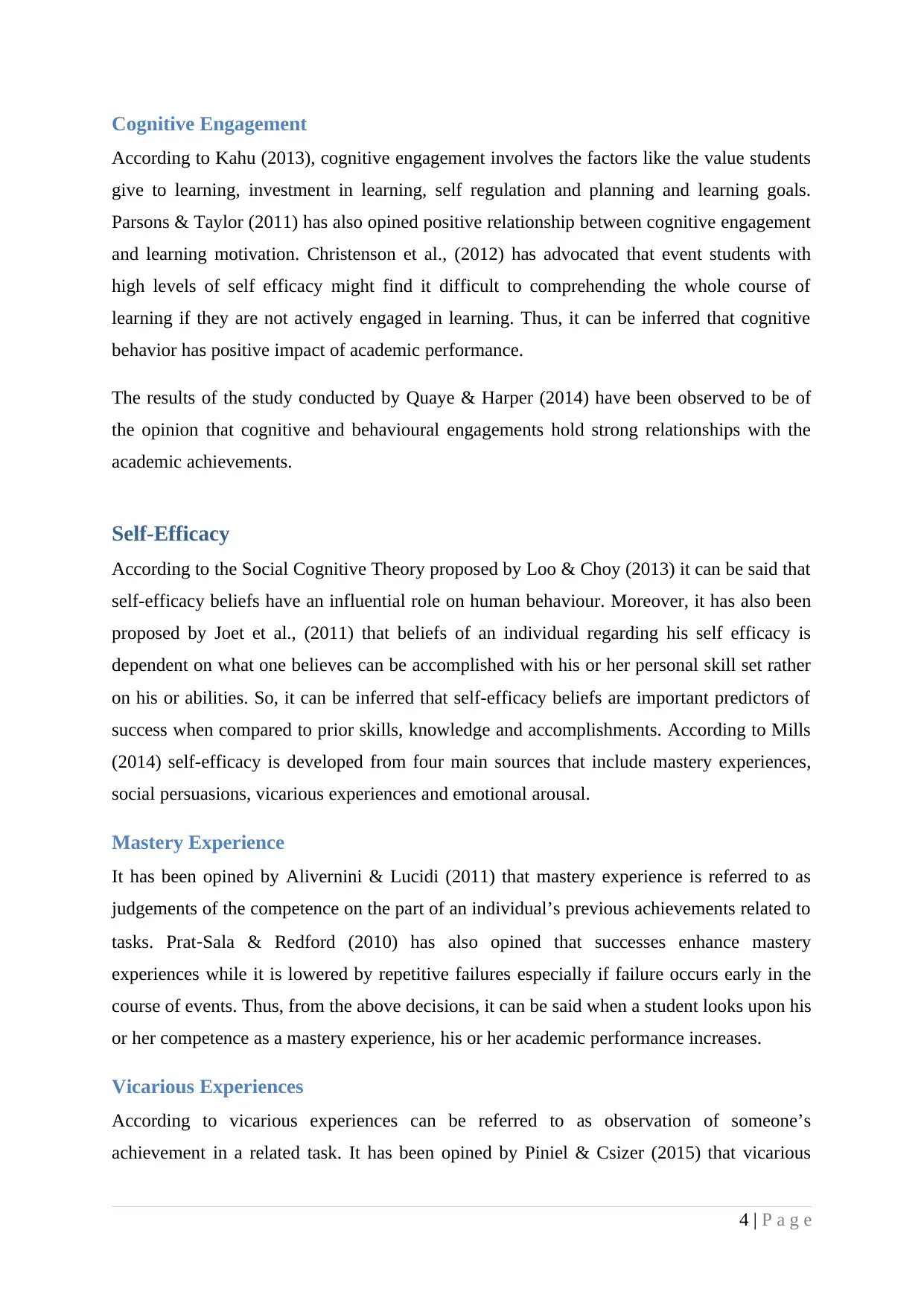
Cognitive Engagement
According to Kahu (2013), cognitive engagement involves the factors like the value students
give to learning, investment in learning, self regulation and planning and learning goals.
Parsons & Taylor (2011) has also opined positive relationship between cognitive engagement
and learning motivation. Christenson et al., (2012) has advocated that event students with
high levels of self efficacy might find it difficult to comprehending the whole course of
learning if they are not actively engaged in learning. Thus, it can be inferred that cognitive
behavior has positive impact of academic performance.
The results of the study conducted by Quaye & Harper (2014) have been observed to be of
the opinion that cognitive and behavioural engagements hold strong relationships with the
academic achievements.
Self-Efficacy
According to the Social Cognitive Theory proposed by Loo & Choy (2013) it can be said that
self-efficacy beliefs have an influential role on human behaviour. Moreover, it has also been
proposed by Joet et al., (2011) that beliefs of an individual regarding his self efficacy is
dependent on what one believes can be accomplished with his or her personal skill set rather
on his or abilities. So, it can be inferred that self-efficacy beliefs are important predictors of
success when compared to prior skills, knowledge and accomplishments. According to Mills
(2014) self-efficacy is developed from four main sources that include mastery experiences,
social persuasions, vicarious experiences and emotional arousal.
Mastery Experience
It has been opined by Alivernini & Lucidi (2011) that mastery experience is referred to as
judgements of the competence on the part of an individual’s previous achievements related to
tasks. Prat‐Sala & Redford (2010) has also opined that successes enhance mastery
experiences while it is lowered by repetitive failures especially if failure occurs early in the
course of events. Thus, from the above decisions, it can be said when a student looks upon his
or her competence as a mastery experience, his or her academic performance increases.
Vicarious Experiences
According to vicarious experiences can be referred to as observation of someone’s
achievement in a related task. It has been opined by Piniel & Csizer (2015) that vicarious
4 | P a g e
According to Kahu (2013), cognitive engagement involves the factors like the value students
give to learning, investment in learning, self regulation and planning and learning goals.
Parsons & Taylor (2011) has also opined positive relationship between cognitive engagement
and learning motivation. Christenson et al., (2012) has advocated that event students with
high levels of self efficacy might find it difficult to comprehending the whole course of
learning if they are not actively engaged in learning. Thus, it can be inferred that cognitive
behavior has positive impact of academic performance.
The results of the study conducted by Quaye & Harper (2014) have been observed to be of
the opinion that cognitive and behavioural engagements hold strong relationships with the
academic achievements.
Self-Efficacy
According to the Social Cognitive Theory proposed by Loo & Choy (2013) it can be said that
self-efficacy beliefs have an influential role on human behaviour. Moreover, it has also been
proposed by Joet et al., (2011) that beliefs of an individual regarding his self efficacy is
dependent on what one believes can be accomplished with his or her personal skill set rather
on his or abilities. So, it can be inferred that self-efficacy beliefs are important predictors of
success when compared to prior skills, knowledge and accomplishments. According to Mills
(2014) self-efficacy is developed from four main sources that include mastery experiences,
social persuasions, vicarious experiences and emotional arousal.
Mastery Experience
It has been opined by Alivernini & Lucidi (2011) that mastery experience is referred to as
judgements of the competence on the part of an individual’s previous achievements related to
tasks. Prat‐Sala & Redford (2010) has also opined that successes enhance mastery
experiences while it is lowered by repetitive failures especially if failure occurs early in the
course of events. Thus, from the above decisions, it can be said when a student looks upon his
or her competence as a mastery experience, his or her academic performance increases.
Vicarious Experiences
According to vicarious experiences can be referred to as observation of someone’s
achievement in a related task. It has been opined by Piniel & Csizer (2015) that vicarious
4 | P a g e
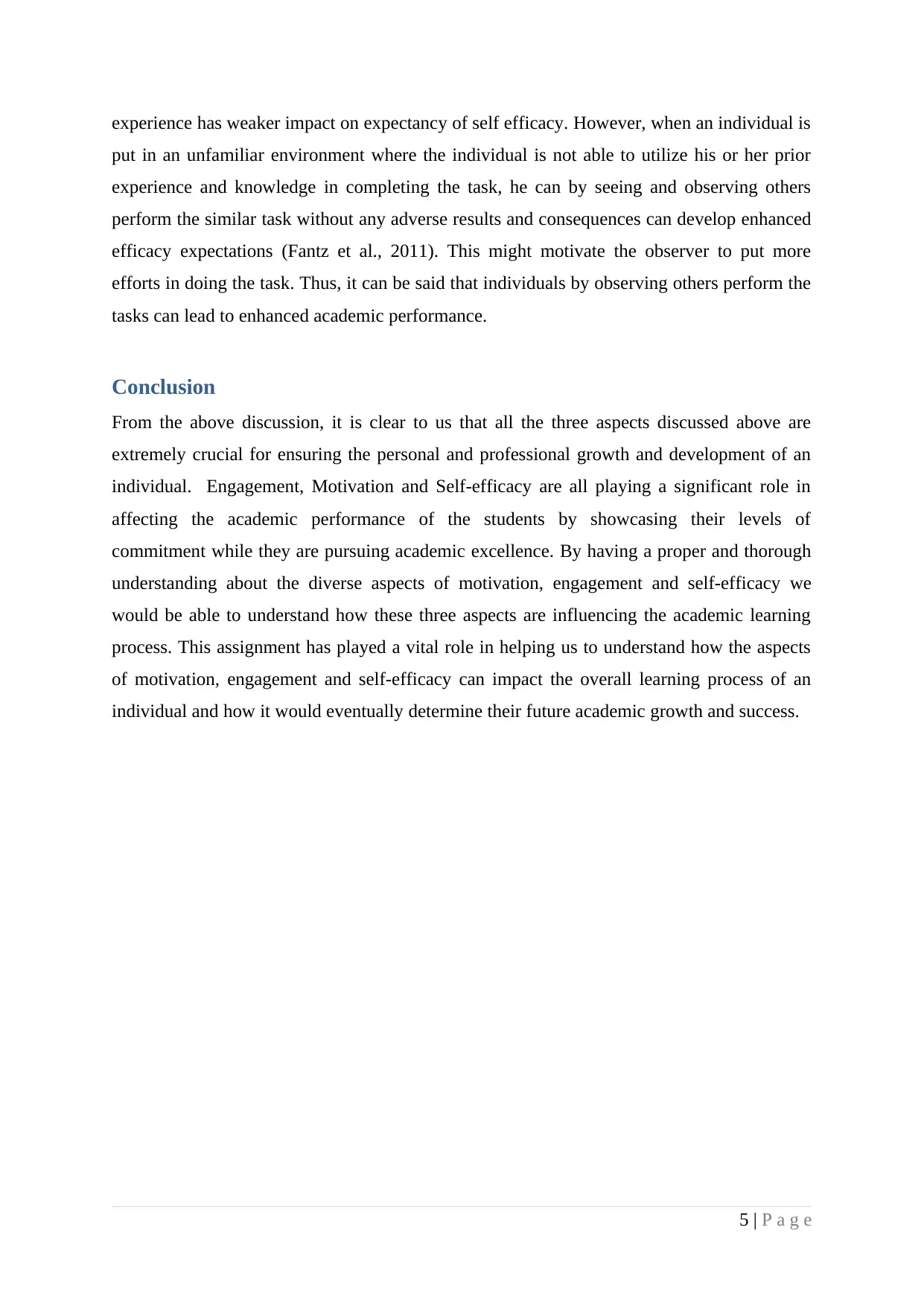
experience has weaker impact on expectancy of self efficacy. However, when an individual is
put in an unfamiliar environment where the individual is not able to utilize his or her prior
experience and knowledge in completing the task, he can by seeing and observing others
perform the similar task without any adverse results and consequences can develop enhanced
efficacy expectations (Fantz et al., 2011). This might motivate the observer to put more
efforts in doing the task. Thus, it can be said that individuals by observing others perform the
tasks can lead to enhanced academic performance.
Conclusion
From the above discussion, it is clear to us that all the three aspects discussed above are
extremely crucial for ensuring the personal and professional growth and development of an
individual. Engagement, Motivation and Self-efficacy are all playing a significant role in
affecting the academic performance of the students by showcasing their levels of
commitment while they are pursuing academic excellence. By having a proper and thorough
understanding about the diverse aspects of motivation, engagement and self-efficacy we
would be able to understand how these three aspects are influencing the academic learning
process. This assignment has played a vital role in helping us to understand how the aspects
of motivation, engagement and self-efficacy can impact the overall learning process of an
individual and how it would eventually determine their future academic growth and success.
5 | P a g e
put in an unfamiliar environment where the individual is not able to utilize his or her prior
experience and knowledge in completing the task, he can by seeing and observing others
perform the similar task without any adverse results and consequences can develop enhanced
efficacy expectations (Fantz et al., 2011). This might motivate the observer to put more
efforts in doing the task. Thus, it can be said that individuals by observing others perform the
tasks can lead to enhanced academic performance.
Conclusion
From the above discussion, it is clear to us that all the three aspects discussed above are
extremely crucial for ensuring the personal and professional growth and development of an
individual. Engagement, Motivation and Self-efficacy are all playing a significant role in
affecting the academic performance of the students by showcasing their levels of
commitment while they are pursuing academic excellence. By having a proper and thorough
understanding about the diverse aspects of motivation, engagement and self-efficacy we
would be able to understand how these three aspects are influencing the academic learning
process. This assignment has played a vital role in helping us to understand how the aspects
of motivation, engagement and self-efficacy can impact the overall learning process of an
individual and how it would eventually determine their future academic growth and success.
5 | P a g e
⊘ This is a preview!⊘
Do you want full access?
Subscribe today to unlock all pages.

Trusted by 1+ million students worldwide
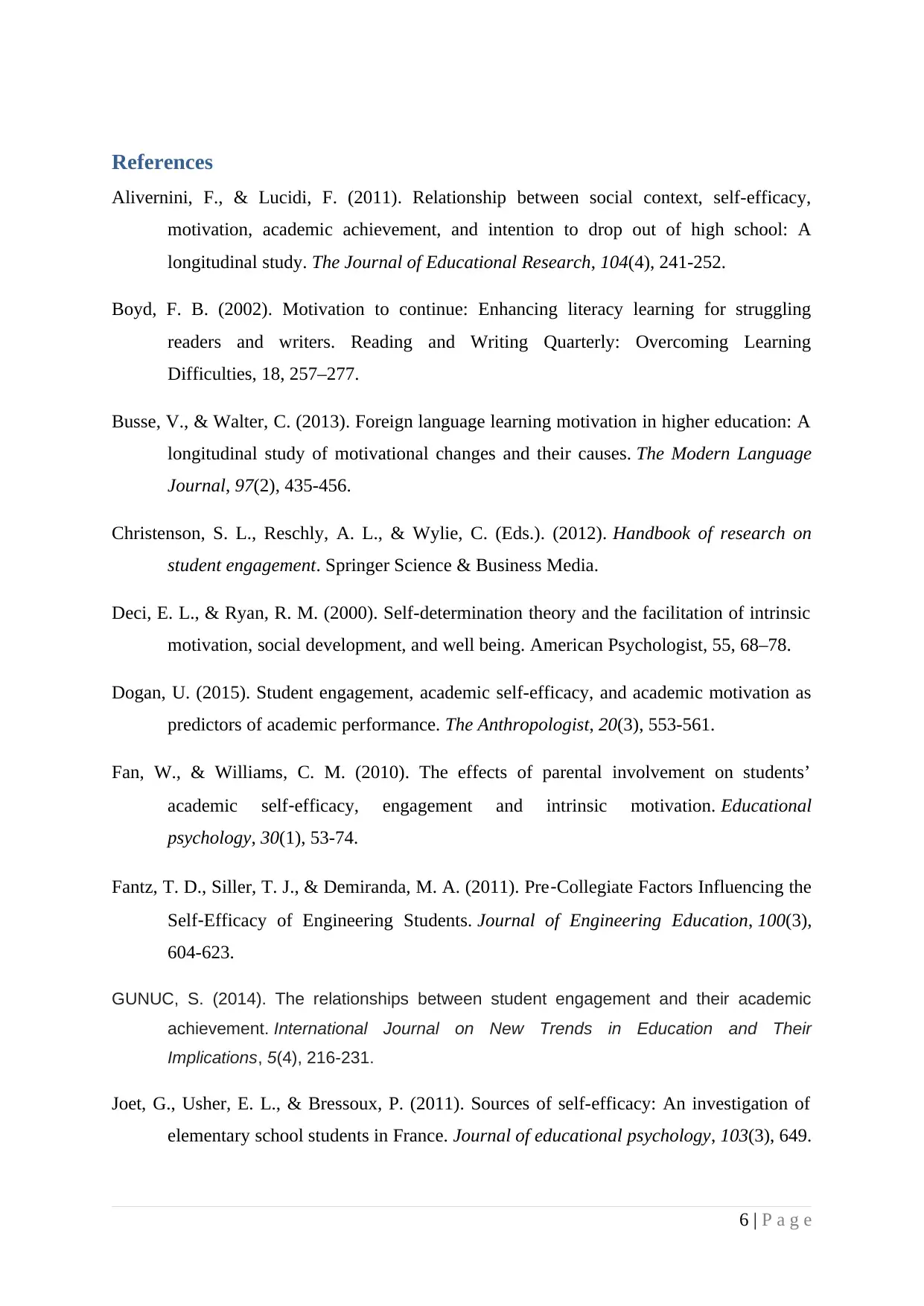
References
Alivernini, F., & Lucidi, F. (2011). Relationship between social context, self-efficacy,
motivation, academic achievement, and intention to drop out of high school: A
longitudinal study. The Journal of Educational Research, 104(4), 241-252.
Boyd, F. B. (2002). Motivation to continue: Enhancing literacy learning for struggling
readers and writers. Reading and Writing Quarterly: Overcoming Learning
Difficulties, 18, 257–277.
Busse, V., & Walter, C. (2013). Foreign language learning motivation in higher education: A
longitudinal study of motivational changes and their causes. The Modern Language
Journal, 97(2), 435-456.
Christenson, S. L., Reschly, A. L., & Wylie, C. (Eds.). (2012). Handbook of research on
student engagement. Springer Science & Business Media.
Deci, E. L., & Ryan, R. M. (2000). Self-determination theory and the facilitation of intrinsic
motivation, social development, and well being. American Psychologist, 55, 68–78.
Dogan, U. (2015). Student engagement, academic self-efficacy, and academic motivation as
predictors of academic performance. The Anthropologist, 20(3), 553-561.
Fan, W., & Williams, C. M. (2010). The effects of parental involvement on students’
academic self‐efficacy, engagement and intrinsic motivation. Educational
psychology, 30(1), 53-74.
Fantz, T. D., Siller, T. J., & Demiranda, M. A. (2011). Pre‐Collegiate Factors Influencing the
Self‐Efficacy of Engineering Students. Journal of Engineering Education, 100(3),
604-623.
GUNUC, S. (2014). The relationships between student engagement and their academic
achievement. International Journal on New Trends in Education and Their
Implications, 5(4), 216-231.
Joet, G., Usher, E. L., & Bressoux, P. (2011). Sources of self-efficacy: An investigation of
elementary school students in France. Journal of educational psychology, 103(3), 649.
6 | P a g e
Alivernini, F., & Lucidi, F. (2011). Relationship between social context, self-efficacy,
motivation, academic achievement, and intention to drop out of high school: A
longitudinal study. The Journal of Educational Research, 104(4), 241-252.
Boyd, F. B. (2002). Motivation to continue: Enhancing literacy learning for struggling
readers and writers. Reading and Writing Quarterly: Overcoming Learning
Difficulties, 18, 257–277.
Busse, V., & Walter, C. (2013). Foreign language learning motivation in higher education: A
longitudinal study of motivational changes and their causes. The Modern Language
Journal, 97(2), 435-456.
Christenson, S. L., Reschly, A. L., & Wylie, C. (Eds.). (2012). Handbook of research on
student engagement. Springer Science & Business Media.
Deci, E. L., & Ryan, R. M. (2000). Self-determination theory and the facilitation of intrinsic
motivation, social development, and well being. American Psychologist, 55, 68–78.
Dogan, U. (2015). Student engagement, academic self-efficacy, and academic motivation as
predictors of academic performance. The Anthropologist, 20(3), 553-561.
Fan, W., & Williams, C. M. (2010). The effects of parental involvement on students’
academic self‐efficacy, engagement and intrinsic motivation. Educational
psychology, 30(1), 53-74.
Fantz, T. D., Siller, T. J., & Demiranda, M. A. (2011). Pre‐Collegiate Factors Influencing the
Self‐Efficacy of Engineering Students. Journal of Engineering Education, 100(3),
604-623.
GUNUC, S. (2014). The relationships between student engagement and their academic
achievement. International Journal on New Trends in Education and Their
Implications, 5(4), 216-231.
Joet, G., Usher, E. L., & Bressoux, P. (2011). Sources of self-efficacy: An investigation of
elementary school students in France. Journal of educational psychology, 103(3), 649.
6 | P a g e
Paraphrase This Document
Need a fresh take? Get an instant paraphrase of this document with our AI Paraphraser
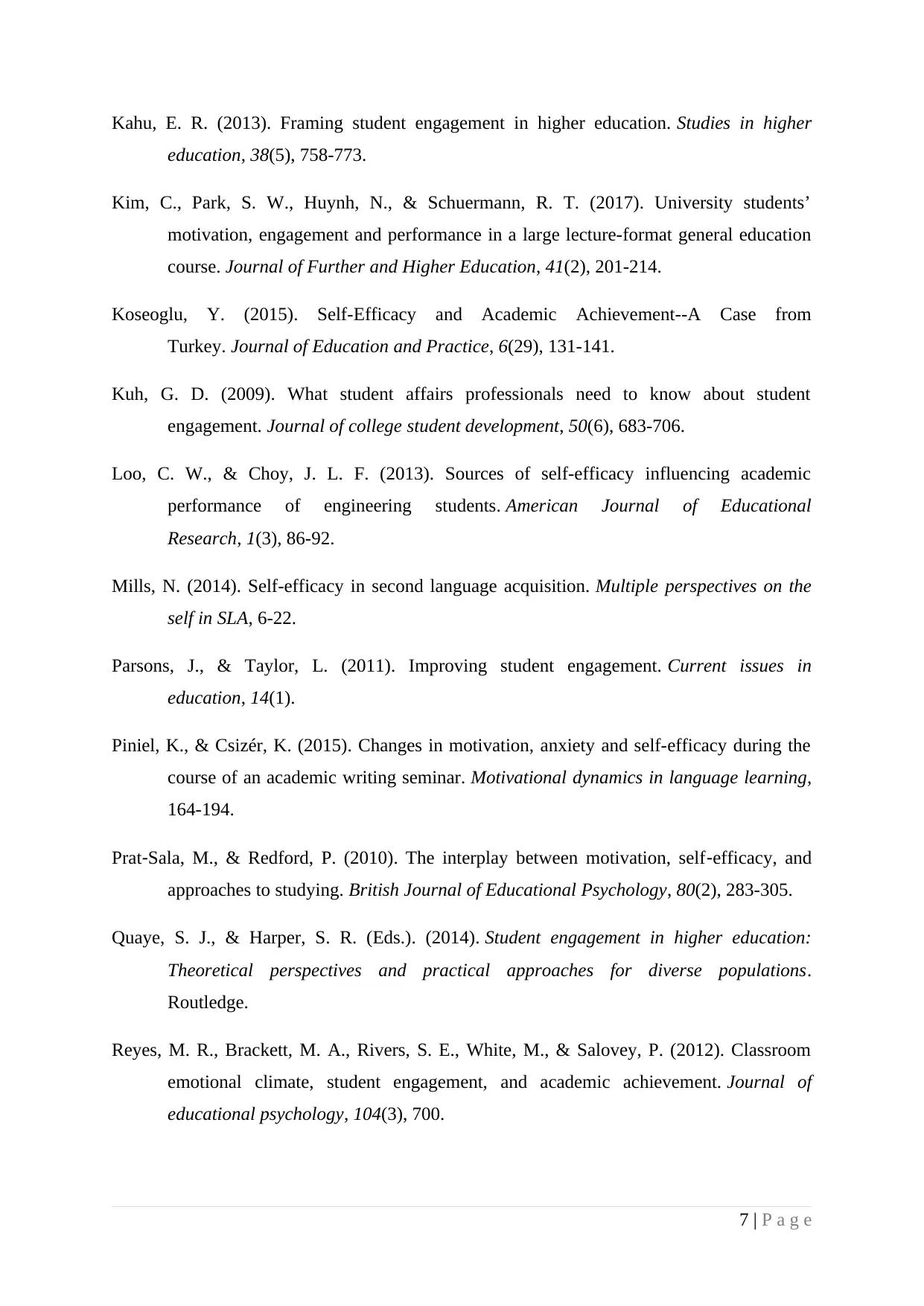
Kahu, E. R. (2013). Framing student engagement in higher education. Studies in higher
education, 38(5), 758-773.
Kim, C., Park, S. W., Huynh, N., & Schuermann, R. T. (2017). University students’
motivation, engagement and performance in a large lecture-format general education
course. Journal of Further and Higher Education, 41(2), 201-214.
Koseoglu, Y. (2015). Self-Efficacy and Academic Achievement--A Case from
Turkey. Journal of Education and Practice, 6(29), 131-141.
Kuh, G. D. (2009). What student affairs professionals need to know about student
engagement. Journal of college student development, 50(6), 683-706.
Loo, C. W., & Choy, J. L. F. (2013). Sources of self-efficacy influencing academic
performance of engineering students. American Journal of Educational
Research, 1(3), 86-92.
Mills, N. (2014). Self-efficacy in second language acquisition. Multiple perspectives on the
self in SLA, 6-22.
Parsons, J., & Taylor, L. (2011). Improving student engagement. Current issues in
education, 14(1).
Piniel, K., & Csizér, K. (2015). Changes in motivation, anxiety and self-efficacy during the
course of an academic writing seminar. Motivational dynamics in language learning,
164-194.
Prat‐Sala, M., & Redford, P. (2010). The interplay between motivation, self‐efficacy, and
approaches to studying. British Journal of Educational Psychology, 80(2), 283-305.
Quaye, S. J., & Harper, S. R. (Eds.). (2014). Student engagement in higher education:
Theoretical perspectives and practical approaches for diverse populations.
Routledge.
Reyes, M. R., Brackett, M. A., Rivers, S. E., White, M., & Salovey, P. (2012). Classroom
emotional climate, student engagement, and academic achievement. Journal of
educational psychology, 104(3), 700.
7 | P a g e
education, 38(5), 758-773.
Kim, C., Park, S. W., Huynh, N., & Schuermann, R. T. (2017). University students’
motivation, engagement and performance in a large lecture-format general education
course. Journal of Further and Higher Education, 41(2), 201-214.
Koseoglu, Y. (2015). Self-Efficacy and Academic Achievement--A Case from
Turkey. Journal of Education and Practice, 6(29), 131-141.
Kuh, G. D. (2009). What student affairs professionals need to know about student
engagement. Journal of college student development, 50(6), 683-706.
Loo, C. W., & Choy, J. L. F. (2013). Sources of self-efficacy influencing academic
performance of engineering students. American Journal of Educational
Research, 1(3), 86-92.
Mills, N. (2014). Self-efficacy in second language acquisition. Multiple perspectives on the
self in SLA, 6-22.
Parsons, J., & Taylor, L. (2011). Improving student engagement. Current issues in
education, 14(1).
Piniel, K., & Csizér, K. (2015). Changes in motivation, anxiety and self-efficacy during the
course of an academic writing seminar. Motivational dynamics in language learning,
164-194.
Prat‐Sala, M., & Redford, P. (2010). The interplay between motivation, self‐efficacy, and
approaches to studying. British Journal of Educational Psychology, 80(2), 283-305.
Quaye, S. J., & Harper, S. R. (Eds.). (2014). Student engagement in higher education:
Theoretical perspectives and practical approaches for diverse populations.
Routledge.
Reyes, M. R., Brackett, M. A., Rivers, S. E., White, M., & Salovey, P. (2012). Classroom
emotional climate, student engagement, and academic achievement. Journal of
educational psychology, 104(3), 700.
7 | P a g e

Shernoff, D. J., Csikszentmihalyi, M., Schneider, B., & Shernoff, E. S. (2014). Student
engagement in high school classrooms from the perspective of flow theory.
In Applications of Flow in Human Development and Education (pp. 475-494).
Springer Netherlands.
Zeldin, A. L., & Pajares, F. (2000). Against the odds: Self-efficacy beliefs of women in
mathematical, scientific and technological careers. American Educational Research
Journal, 37, 215–246.
8 | P a g e
engagement in high school classrooms from the perspective of flow theory.
In Applications of Flow in Human Development and Education (pp. 475-494).
Springer Netherlands.
Zeldin, A. L., & Pajares, F. (2000). Against the odds: Self-efficacy beliefs of women in
mathematical, scientific and technological careers. American Educational Research
Journal, 37, 215–246.
8 | P a g e
⊘ This is a preview!⊘
Do you want full access?
Subscribe today to unlock all pages.

Trusted by 1+ million students worldwide
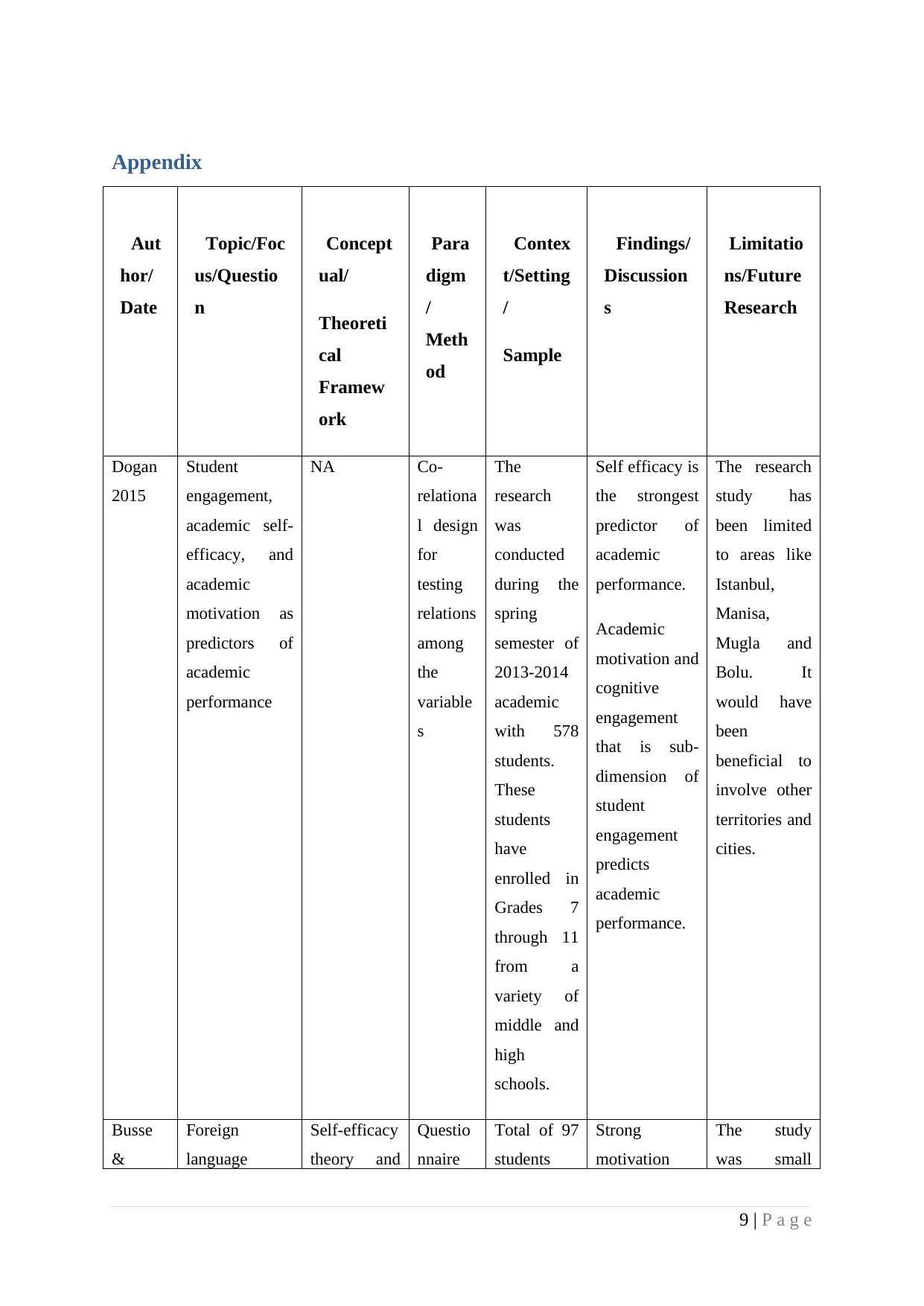
Appendix
Aut
hor/
Date
Topic/Foc
us/Questio
n
Concept
ual/
Theoreti
cal
Framew
ork
Para
digm
/
Meth
od
Contex
t/Setting
/
Sample
Findings/
Discussion
s
Limitatio
ns/Future
Research
Dogan
2015
Student
engagement,
academic self-
efficacy, and
academic
motivation as
predictors of
academic
performance
NA Co-
relationa
l design
for
testing
relations
among
the
variable
s
The
research
was
conducted
during the
spring
semester of
2013-2014
academic
with 578
students.
These
students
have
enrolled in
Grades 7
through 11
from a
variety of
middle and
high
schools.
Self efficacy is
the strongest
predictor of
academic
performance.
Academic
motivation and
cognitive
engagement
that is sub-
dimension of
student
engagement
predicts
academic
performance.
The research
study has
been limited
to areas like
Istanbul,
Manisa,
Mugla and
Bolu. It
would have
been
beneficial to
involve other
territories and
cities.
Busse
&
Foreign
language
Self-efficacy
theory and
Questio
nnaire
Total of 97
students
Strong
motivation
The study
was small
9 | P a g e
Aut
hor/
Date
Topic/Foc
us/Questio
n
Concept
ual/
Theoreti
cal
Framew
ork
Para
digm
/
Meth
od
Contex
t/Setting
/
Sample
Findings/
Discussion
s
Limitatio
ns/Future
Research
Dogan
2015
Student
engagement,
academic self-
efficacy, and
academic
motivation as
predictors of
academic
performance
NA Co-
relationa
l design
for
testing
relations
among
the
variable
s
The
research
was
conducted
during the
spring
semester of
2013-2014
academic
with 578
students.
These
students
have
enrolled in
Grades 7
through 11
from a
variety of
middle and
high
schools.
Self efficacy is
the strongest
predictor of
academic
performance.
Academic
motivation and
cognitive
engagement
that is sub-
dimension of
student
engagement
predicts
academic
performance.
The research
study has
been limited
to areas like
Istanbul,
Manisa,
Mugla and
Bolu. It
would have
been
beneficial to
involve other
territories and
cities.
Busse
&
Foreign
language
Self-efficacy
theory and
Questio
nnaire
Total of 97
students
Strong
motivation
The study
was small
9 | P a g e
Paraphrase This Document
Need a fresh take? Get an instant paraphrase of this document with our AI Paraphraser
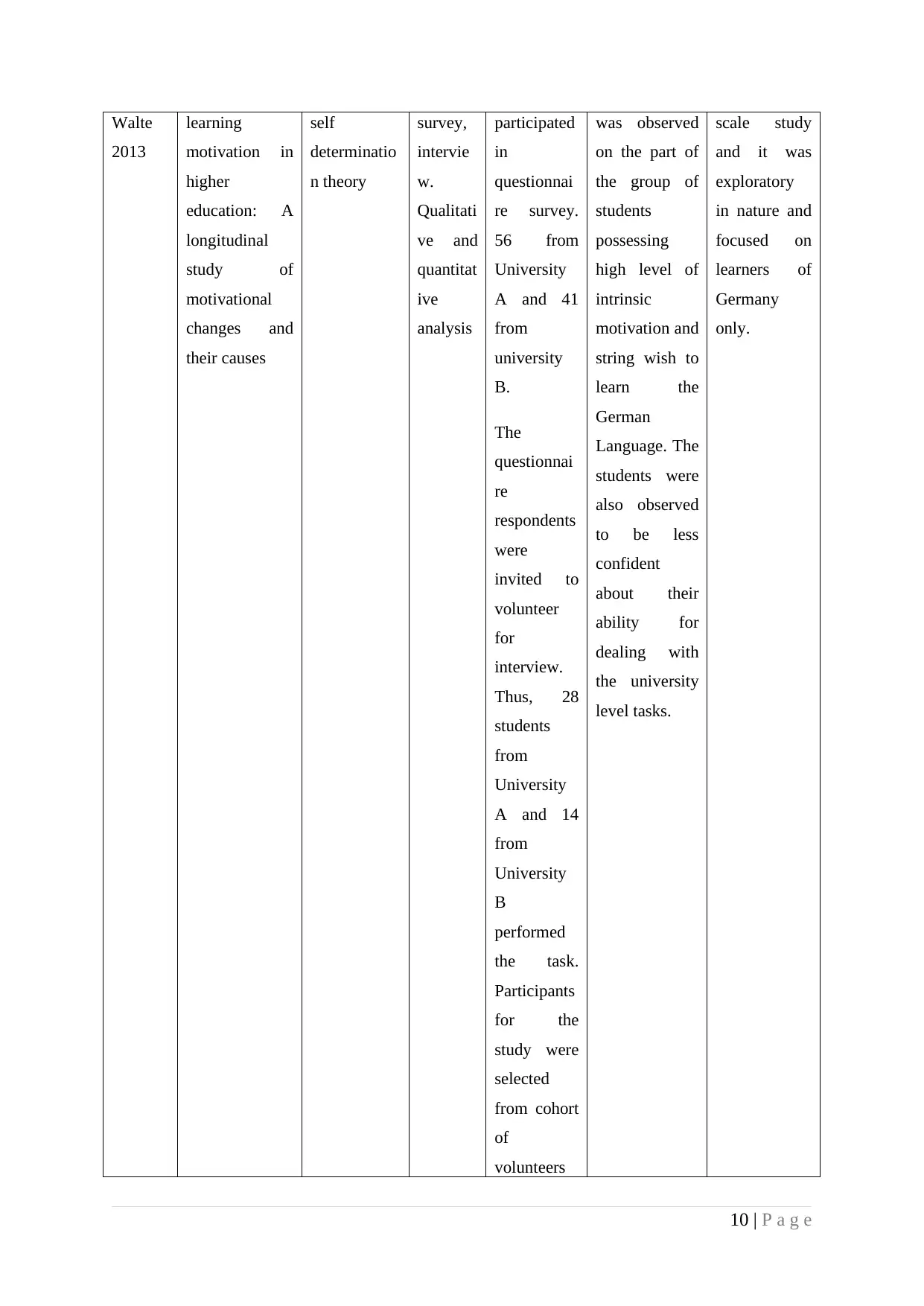
Walte
2013
learning
motivation in
higher
education: A
longitudinal
study of
motivational
changes and
their causes
self
determinatio
n theory
survey,
intervie
w.
Qualitati
ve and
quantitat
ive
analysis
participated
in
questionnai
re survey.
56 from
University
A and 41
from
university
B.
The
questionnai
re
respondents
were
invited to
volunteer
for
interview.
Thus, 28
students
from
University
A and 14
from
University
B
performed
the task.
Participants
for the
study were
selected
from cohort
of
volunteers
was observed
on the part of
the group of
students
possessing
high level of
intrinsic
motivation and
string wish to
learn the
German
Language. The
students were
also observed
to be less
confident
about their
ability for
dealing with
the university
level tasks.
scale study
and it was
exploratory
in nature and
focused on
learners of
Germany
only.
10 | P a g e
2013
learning
motivation in
higher
education: A
longitudinal
study of
motivational
changes and
their causes
self
determinatio
n theory
survey,
intervie
w.
Qualitati
ve and
quantitat
ive
analysis
participated
in
questionnai
re survey.
56 from
University
A and 41
from
university
B.
The
questionnai
re
respondents
were
invited to
volunteer
for
interview.
Thus, 28
students
from
University
A and 14
from
University
B
performed
the task.
Participants
for the
study were
selected
from cohort
of
volunteers
was observed
on the part of
the group of
students
possessing
high level of
intrinsic
motivation and
string wish to
learn the
German
Language. The
students were
also observed
to be less
confident
about their
ability for
dealing with
the university
level tasks.
scale study
and it was
exploratory
in nature and
focused on
learners of
Germany
only.
10 | P a g e
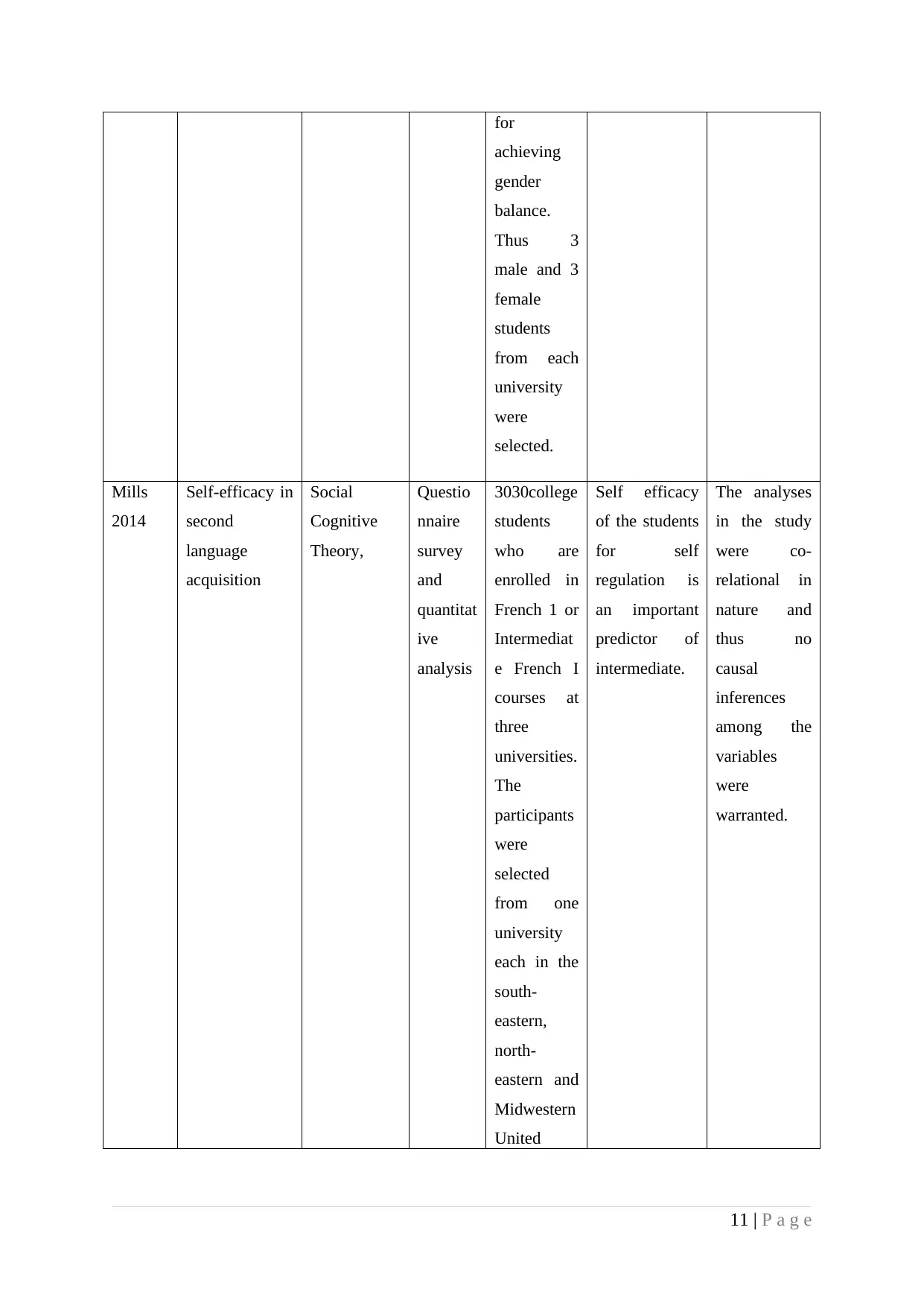
for
achieving
gender
balance.
Thus 3
male and 3
female
students
from each
university
were
selected.
Mills
2014
Self-efficacy in
second
language
acquisition
Social
Cognitive
Theory,
Questio
nnaire
survey
and
quantitat
ive
analysis
3030college
students
who are
enrolled in
French 1 or
Intermediat
e French I
courses at
three
universities.
The
participants
were
selected
from one
university
each in the
south-
eastern,
north-
eastern and
Midwestern
United
Self efficacy
of the students
for self
regulation is
an important
predictor of
intermediate.
The analyses
in the study
were co-
relational in
nature and
thus no
causal
inferences
among the
variables
were
warranted.
11 | P a g e
achieving
gender
balance.
Thus 3
male and 3
female
students
from each
university
were
selected.
Mills
2014
Self-efficacy in
second
language
acquisition
Social
Cognitive
Theory,
Questio
nnaire
survey
and
quantitat
ive
analysis
3030college
students
who are
enrolled in
French 1 or
Intermediat
e French I
courses at
three
universities.
The
participants
were
selected
from one
university
each in the
south-
eastern,
north-
eastern and
Midwestern
United
Self efficacy
of the students
for self
regulation is
an important
predictor of
intermediate.
The analyses
in the study
were co-
relational in
nature and
thus no
causal
inferences
among the
variables
were
warranted.
11 | P a g e
⊘ This is a preview!⊘
Do you want full access?
Subscribe today to unlock all pages.

Trusted by 1+ million students worldwide
1 out of 14
Related Documents
Your All-in-One AI-Powered Toolkit for Academic Success.
+13062052269
info@desklib.com
Available 24*7 on WhatsApp / Email
![[object Object]](/_next/static/media/star-bottom.7253800d.svg)
Unlock your academic potential
Copyright © 2020–2025 A2Z Services. All Rights Reserved. Developed and managed by ZUCOL.





